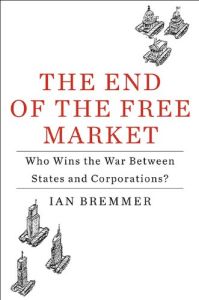Join getAbstract to access the summary!

Join getAbstract to access the summary!
Ian Bremmer
The End of the Free Market
Who Wins the War Between States and Corporations?
Portfolio, 2010
What's inside?
No truce appears to be on the horizon in the battle between government control and free markets.
Recommendation
No truce appears on the horizon in the battle between government control and free markets, a conflict that has intensified in the aftermath of the 2008-2009 recession. Political strategist Ian Bremmer examines the differing models of “state capitalism” that have gained ground in emerging economies around the world. Using varying levels of political control, countries such as China, Russia and Saudi Arabia are adapting the capitalist scenario to their particular situations and needs, thereby presenting obstacles to a fair fight with Western businesses. While decrying the unfair advantage governments bring to successful emerging economies, Bremmer concedes that free markets alone can’t solve all society’s issues, and he advocates for “better government, not less government.” getAbstract recommends this thorough, cogent study to global business executives looking to understand and compete in state-capitalist countries.
Summary
About the Author
Ian Bremmer is president of Eurasia Group, a political-risk consulting company.























Comment on this summary